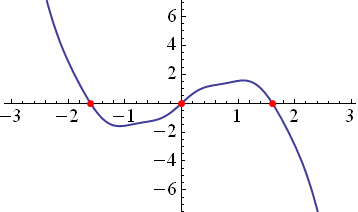Some of you may remember hearing about the film What the Bleep Do We Know!?, which came out in 2004. It’s a documentary that explains a rather new-agey interpretation of Quantum Mechanics, and how this might apply to consciousness and daily life. I know that this is old news, but when it comes to something as nearly mainstream as What the Bleep, it doesn’t hurt to revisit it one more time.
The ScienceAs the title of the movie suggests, one of the central messages of the movie is about how little we know. This is perhaps an honorable sentiment, discouraging arrogance and encouraging open-mindedness. It is in fact true that Quantum Mechanics has several different interpretations which are “up for grabs”. However, it’s not completely up for grabs; you do need to know a bit about the science in order to make an informed judgment on the interpretations. What the Bleep, betraying its supposed open-mindedness, gives you a very spotty and distorted view of the science.
Much of the Quantum Mechanics explanation occurs on "Duke Reginald's court of unending possibilities”, a basketball court governed by quantum mechanics. The film uses fancy effects to drive home the strangeness of quantum mechanics. When you aren’t looking, that basketball is in many places at once. When you look at the basketball, the possibilities collapse into one. What the film fails to mention, is that this is only really true on small scales. Every particle is in many places simultaneously, but most of those places are in a tiny region smaller than a nanometer.
That single omission, by itself, would be forgivable. I've seen worse. However, they go on to deliver a very wild interpretation of quantum mechanics: we choose the results of our observations. Really? So if we wanted, and believed, with every fiber of our being, we could choose to observe a basketball one meter to the left? Wouldn't that contradict quantum mechanics, which states that there is only a small probability of it appearing one meter to the left? I must have missed the "human will" term in Schrodinger's equation, because last I checked, the probabilities are completely independent of the observer's state of mind.
Furthermore, they've completely jumbled their interpretations of Quantum Mechanics. Presumably, they're going by the Copenhagen Interpretation because that's the only one with "observers" in it. Under the Copenhagen interpretation, when we observe objects, they "collapse" into a single possibility. However, "observer" is a technical term that has been abused here. The "observer" need not be human. The observer could simply be a measurement device. The device could be measuring millions of particles, but it will still collapse all of them, regardless of whether anyone is paying attention to the specific results. This is an undeniable experimental fact that must be explained by
all viable interpretations of Quantum Mechanics.
You
could say that the measurement device itself splits into many different possibilities. In one possibility, the device sees the particle here, and in the other possibility, the device sees the particle there. And then, when we look at the device, it collapses into only one of those possibilities. But then, if you like, you could also say that humans split into many different possibilities, and that no collapse is occurring at all. This is called the Many-Worlds Interpretation.
I'm glossing over all the details here, but this is still way better than what appeared in the film, which didn't even bother to name a single quantum interpretation.
The Copenhagen Interpretation and Many-Worlds Interpretation are the two most popular interpretations of quantum mechanics. In neither of them is the human mind so completely special that it's the only thing in the universe that can collapse quantum possibilities. Why should we think that consciousness plays any role if a mere measuring device gives the same experimental results?
Their flawed interpretation goes completely awry when interviewee Candace Pert goes on to say that human cells can collapse quantum possibilities, and therefore they are the smallest units of consciousness. This led into some rather boring scenes with anthropomorphic cells. So, let me get this straight. Because only human observers can cause quantum collapse (false!), consciousness must play a role. And then, because other things also cause quantum collapse, we reason that those other things must be conscious too. Garbage in, garbage out.
The PseudoscienceYou might think, so far, that the movie simply gets a bunch of details wrong about quantum mechanics. Yes, I'm a pretty harsh judge when it comes to quantum mechanics. However, they're not just wrong on obscure science details, they're wrong on common sense. These are some strange claims that were scattered throughout the movie:
- Interviewee Joe Dispenza says that when people see a picture and when they imagine a picture, the same areas of the brain light up on scans. He goes on to claim that this means the brain doesn't know the difference between what it sees and what it remembers. I would have thought a guy like Dispenza would realize that a brain scan doesn't tell you absolutely everything about the state of your brain. Just because two brain scans look the same doesn't mean our brains can't tell the difference.
- Interviewee Candace Pert claims that Native Americans initially could not see Columbus' ships approaching, because they had no concept of what a ship is. I'd say this is a good example (if it's true) of how we are likely to see the things we want to see, and miss things that we don't want to see. But the film reenacts the scene in the most literal way imaginable. The shaman cannot see the boat, but he can see the ripples. Only after much watching does the boat appear. I've got to wonder, even if the story were true, how would we know it was true?
- Interviewee John Hagelin says that in a 1993 experiment, he got 4000 people to meditate in order to reduce crimes in Washington D.C. He claims the experiment successfully reduced crime rates by 25%. But 25% reduction compared to what? It was 25% reduction, as compared to the predictions of a model of their own construction. Great.
- The film uses as a prominent example the water experiments of Masaru Emoto. Emoto attached words to glasses of water, and allowed them to form crystals. He then used microscopic photography to capture the resulting crystals. Of course, when the experimenters know exactly which word is attached to which glass, they'll easily be able to pick out whatever crystal best matches. It's perhaps an interesting photography project, but it totally fails as science.
- Interviewee Micael Ledwith claims that if you accept with every "rudiment of your being", you can walk on water. What if I say with every rudiment of my being that you can't? Does that cancel it out or something?
- Joe Dispenza says some pretty weird things about he "creates his day" through quantum mechanics. He claims lots of things happen that are unexplainable any other way. No examples, though. If you ask me, this is a much better example of people seeing only what they want to see than that Columbus thing.
- The punchline: One of the interviewees is Ramtha, a 35,000 year old spirit-warrior from Atlantis. Ramtha is being channelled by a woman named JZ Knight. She says the funniest things through out the movie, but only in the credits does it say who she really is (I, of course, knew ahead of time). If you do some digging, you find that the entire movie was put out by the Ramtha School of Enlightenment. Of course, I'm just an amateur critic, not an investigative reporter, so you'll want to refer to Salon for the digging.
The FableOne common response is, "What's so bad about it if it helps people?" After all, fables are false stories, but they still convey a moral message.
But if we say it's acceptable to use bad arguments when they come to the right conclusions, what's to stop people from using bad arguments to come to the wrong conclusions? What's to stop people from convincing themselves, for instance, that they really are listening to a 35,000 Atlantean spirit? In any case, if the "moral" of the film is so great, then it stands to reason that you should be able to find a
good argument in favor of it. One that doesn't involve distortions of quantum mechanics or pseudoscience about transcendental meditation.
But I must say, it actually struck me how
negative the message of the film was.
The most striking example came out of Emoto's water crystals. After showing the photos, a mysterious bystander says to the protagonist, "If thoughts will do that to water, imagine what our thoughts can do to us." That would have been a sorta maybe positive thing to say, if it weren't for the one water crystal photo that said "You make me sick. I will kill you." Apparently, if you think negative thoughts, you'll become ugly? The film also says that if you can't control your emotions, you must be addicted to them. Later in the film, this is shown to happen to the protagonist. I understand negative thoughts being bad and all, but should we really instill into people a fear of negativity? Fear of thought is very negative indeed.
On the more philosophical end, I find their use of quantum mechanics shockingly cynical. They make it very clear that without quantum mechanics, there is no free will. Several of the interviewees seem to think free will is vital to being able to truly live. I study physics, and I think it's really important and everything, but if it turns out that quantum mechanics is wrong, or if it turns out that it doesn't have a significant impact on free will, I think I'd still find the will to live. (I've got a fuller discussion of how quantum mechanics relates to free will
here.)
In another example of questionable morals, interviewee Jeffrey Satinover states that some psychological problems are not really psychological problems, but the result of bad choices. That might seem like a positive thing to say to people who are trying to overcome their psychological problems, but you're also saying it to the people who have tried and failed. I guess now it's their own fault for failing. Later, the protagonist chucks her anxiety medication while a voiceover says "Try it out yourself". That may work for a few people, but just imagine the pain it would cause to everyone else.
Of course, not every "moral" in the movie was bad, and I am being a little nitpicky. But this is the sort of thing that happens when you accept bad arguments just because they give you good morals. You'll end up getting not-so-good morals too. All at the price of distorting science. Was it worth it?
Extra links:Skeptico: Excellent review, with a much more complete list of links
Salon: exposes the Ramtha cult behind the film
Blogging Heads: physicist David Albert talks about how the film misrepresented him through editting




















